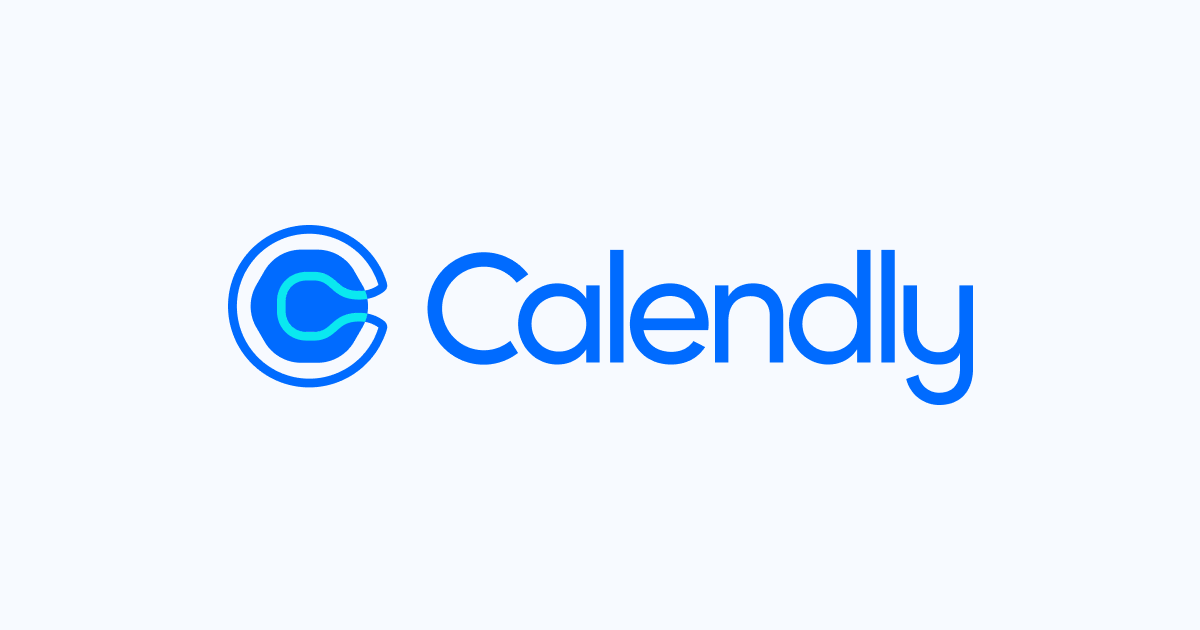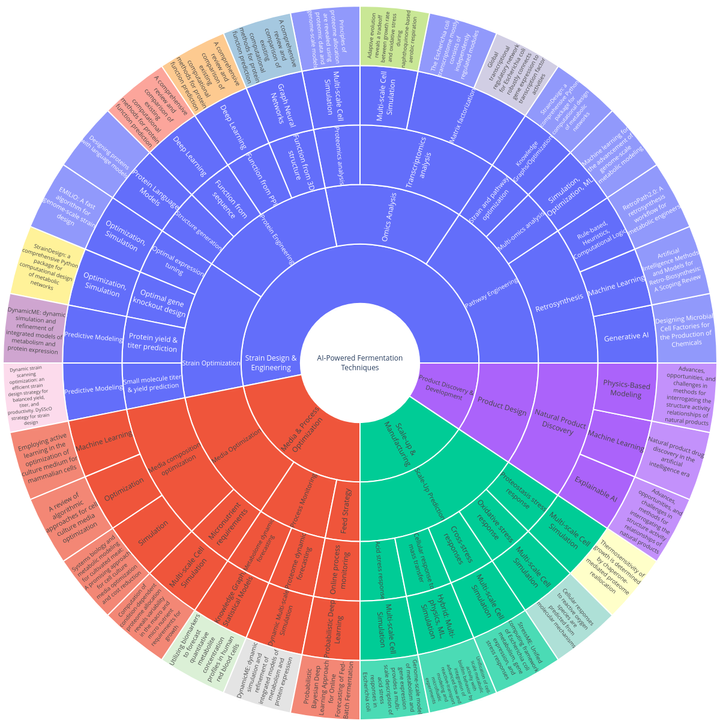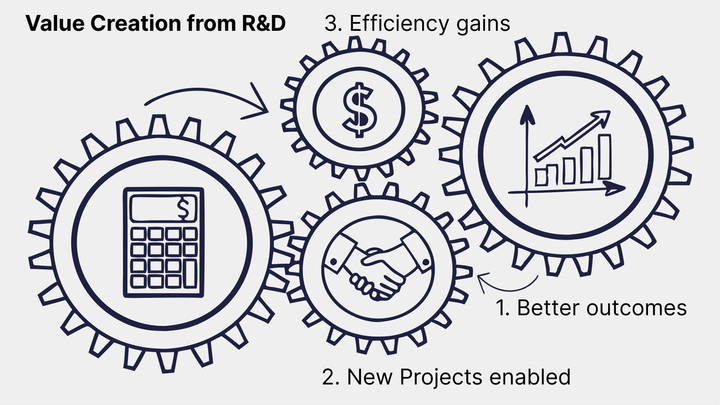5 reasons to NOT become an AI-powered fermentation startup

As a fermentation startup lead, you've undoubtedly heard about how AI can transform your business growth and massively boost your day-to-day productivity. You might be wondering if your startup needs AI, too. You've seen impressive taglines like 10X growth, reduced costs, and accelerated outcomes. You're thinking: is AI another buzzword or am I missing a huge opportunity to differentiate my fermentation startup?
To help you reflect on your situation, and assess whether you should adopt AI, here are 5 reasons you should NOT pivot your fermentation startup into an AI-powered fermentation startup.
5 reasons to NOT become an AI powered fermentation startup
Do not pivot into an AI-powered fermentation startup if:
- AI does not strengthen your core value proposition
- AI will not alleviate the active constraint for your startup to advance to the next stage
- You are not willing to explore AI beyond just ChatGPT and other LLMs
- Your team is not equipped to use the AI platform and you are not prepared to hire a dedicated AI team member
- You are not prepared to invest 12-24 months and $100-$200k budget
Note that we're not talking about getting a subscription to Perplexity or other off-the-shelf AI tools and using them to increase productivity. You should absolutely do that (I certainly do)! Although, perhaps check possible privacy/confidentiality issues.
Here, by AI-powered fermentation startup, I mean pivoting into making AI a core component of your value proposition to your customers. A differentiating factor that strengthens your moat.
Reason #1 - AI does not strengthen your core value proposition
If AI does not strengthen your core value proposition, then it is a distraction. It can siphon off a large amount of resources, time, and focus away from the game-changing vision you started or joined the company with.
Reason #2 - AI will not alleviate the active constraint
This depends entirely on your situation but asking yourself these questions may help get clarity:
- What's the key bottleneck (active constraint) stopping you from meeting your startup's goals?
- Why did you believe AI could solve this problem?
Consider two examples:
Example A:
- What's the key bottleneck (active constraint) stopping you from meeting your startup's goals? The key bottleneck is that our precision fermented food products cannot reach price parity with conventional food, which prevents us from creating a scalable alternative protein company.
- Why did you believe AI would solve this problem? We believe AI can help us lower operational costs that will help us reach price parity.
Several problems with this logic:
- The active constraint is not defined properly. Based on Lever VC's benchmarks, the startup's imminent goal is likely to be: reach a certain titer, media cost, reactor volume, cell density, product functionality, organoleptic testing (for food), and establish novelty and/or defensibility. The active constraint is the bottleneck that must be alleviated to reach that next milestone or deliverable.
- The assumption about how AI can help needs a nuanced assessment. It is deceptive because it is true yet false. AI can indeed help lower operation costs. However, this depends on what the bottleneck for operational inefficiency currently is. Furthermore, improving the economics of alt-proteins and similar is a multi-faceted problem, with many factors outside the startup's control. Furthermore, the most impactful solutions may lie elsewhere. E.g., advancement in continuous fermentors, improving down-stream processing (DSP), or designing a process that eliminates costly DSP steps.
Example B:
- What's the key bottleneck (active constraint) stopping you from meeting your startup's goals? The key bottleneck is that for every new project, it takes 6 months to optimize our cultures to produce an ingredient meeting customer specifications. This slow turnaround is the active constraint for creating a scalable, platform technology business.
- Why did you believe AI would solve this problem? We believe AI can run through many more culture configurations than we can test in the lab, and suggest the optimal designs rapidly. We believe the AI can learn from our data, cell culture and omics, and continually get better at this task with more data.
This is much better. Even here, the value proposition could be stated more explicitly in the B2B context. How does speed (6 months vs. shorter turnaround with AI) impact the value proposition and how does it compare with competitors?
The belief that AI can solve this problem is mostly accurate. Even here, there are nuances.
Firstly, is speed the main value add of AI? Or is the possibility of finding even better ingredients, or better culture designs by evaluating a much bigger design space the big win?
Second, what types of data generation is the startup investing in? Routine bioprocess data, transcriptomics, or metabolomics? How much data and how frequently will they measure? All these considerations determine whether AI can help, and what the optimal tools are.
Third, timing is important. Now might not be the time to invest in AI if your priority is getting enough samples of the ingredient for the upcoming funding round.
Reason #3 - You are not willing to explore AI beyond just ChatGPT and other LLMs
ChatGPT, Claude and other products have made large language models accessible to the masses. While their benefits are many, they aren't always the right tool for alleviating the active constraint.
Luckily, while the buzz around AI may generate misplaced expectations, it has also raised awareness of the broader AI ecosystem.
What is AI?
Gartner (2023) defines AI as "applying advanced analysis and logic-based techniques... to interpret events, support and automate decisions, and take actions."
This definition comprehensively encompasses these categories of AI:
- Robust and mature techniques comprising the majority of use cases in AI today:
- Probabilistic Reasoning
- Computational Logic
- Optimization Techniques
- Emerging techniques (descending order of maturity):
- Natural language processing (NLP)
- Knowledge representation
- Agent-based computing
While this definition does not explicitly highlight techniques such as simulation and digital twins, they are encompassed. For example, I'd place genome-scale models (a specific approach of encoding cellular biochemical knowledge bases to aid in decision making and predictive analytics) at the intersection of computational logic, optimization techniques. and knowledge representation. Cell simulators can also interface with agent-based computing and NLP.
The takeaway is that AI comprises a versatile toolkit, and it's rarely straightforward to identify the ideal approach for a fermentation startup.
Reason #4 - Your team is not equipped to use the AI platform and you are not prepared to hire a dedicated AI team member
Reason #5 - You are not prepared to invest 12-24 months and $100-$200k budget
Reasons 4 and 5 go together.
Pivoting to AI-powered fermentation is not a light investment. A prototype can take upwards of $100k to build. You typically need dedicated staff to leverage the prototype, develop it further, and apply it toward customer projects. Hence the $200k budget (excluding overhead).
Bonus reason: You do not have a clear vision of what AI will do for your startup's long-term trajectory
It's already challenging to determine how to alleviate your startup's key bottlenecks. Even more challenging is navigating the complex AI landscape to identify the ideal AI-leveraged solution. On top of this challenge, you must also have a long-term vision for how AI will help differentiate your platform or product, and strengthen your value proposition.
If you're ready to face these challenging questions head on, and evaluate whether an AI-powered fermentation is optimal for your situation, I'd be happy to talk – you can book a time below:

And if you'd like to receive articles like this direct to your inbox, please subscribe using the "Subscribe" button at the bottom of this page.





